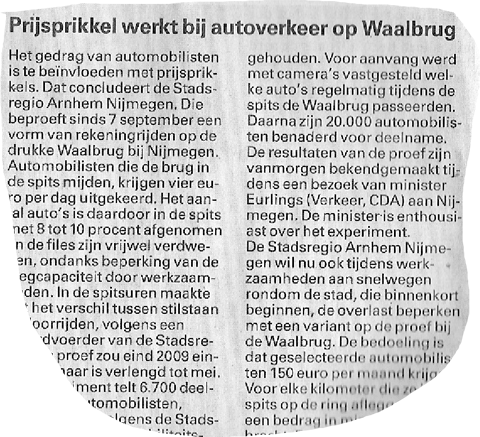A pilot project in Nijmegen that pays drivers to avoid rush hour is a success. There were indeed less traffic jams. According to transport specialists, this shows that a system of paying for driving during rush hour works.
Four euros did the trick to reduce traffic jams at the Waalbrug in Nijmegen. That’s the amount 1,317 of the selected 6,700 drivers were paid to avoid rush hour. The results are remarkable: over the last couple of months, there was a 10 percent drop in the number of cars travelling on the Waalbrug during rush hour.
“This result shows that drivers are sensitive to price changes”, says professor Bert van Wee, professor of transport policy at TU Delft. “And that’s no surprise to scientists, because several other pilot projects, for example on the A12 between Zoetermeer and Den Haag, showed this as well. However many politicians and citizens are still convinced that people have to get from A to B anyhow and are not sensitive to price changes. This belief has been proven to be a fairytale once again, by this pilot project. When there is enough of a reward for reducing traffic jams, people will opt for alternatives, like working at home, taking the bike or public transport.” Van Wee has been researching price policy and its effects for years.
The results of the Nijmegan pilot project were published at a time when there is an intense debate in the Netherlands about road pricing tax schemes. This new system means that people pay less fixed taxes; they pay per kilometre a standard fee that differs between the CO2 emissions of a car, and in addition they pay extra depending on when and where they drive. It’s more expensive to drive during rush hour on the motorway near Delft than it is to drive at the same time on a motorway in the north of the Netherlands. Instead of letting drivers pay extra, the pilot project in Nijmegen rewards drivers. “That’s a very fresh approach and it surprises me that it works so well”, says professor of dynamic traffic management, dr Henk van Zuylen. “It’s also a very smart move to reward instead of punish. But basically it’s the same idea: people pay more for their use of the road when it’s busy. The only difference between rewarding and punishing is the psychology. If a driver avoids rush hour with the new road pricing system, he will pay less in the future than he does now.”
It’s not clear if ‘road pricing’ will be introduced. Camiel Eurlings, the minister of Transport, said that the implementation of road pricing depends on the viewpoint of the ANWB, the Dutch automobile association, and its 4-million members. “One could question whether this is good for democratic decision making”, says Van Wee. Van Zuylen agrees: “The ANWB is an important organisation, but Eurlings should not give them the decisive vote.” At www.anwb.nl members can vote on different statements regarding road pricing. “That’s better than having an opinion poll, in which people can just say yes or no”, Van Zuylen adds. “Hopefully this will make room for balanced opinions.”
De regeling is in strijd met artikel 1 van de grondwet, zeggen de Iraanse studenten. De actiegroep wordt gesteund door de Koninklijke Nederlandse Akademie van Wetenschappen. De wetenschapsorganisatie noemde het besluit begin dit jaar onverdedigbaar en waarschuwde minister Plasterk dat de reputatie van Nederland op het spel staat.
De minister zag echter nog geen reden voor het terugdraaien van de wet. “Er is niet één Iraanse student die zich heeft gemeld voor opleidingen waarin met nucleaire kennis wordt gewerkt”, zei Plasterk in september. “Bovendien kunnen individuele studenten na een screening gewoon aan de slag.”



Comments are closed.